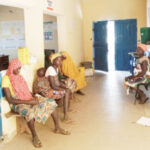Few days ago, stakeholders met in Abuja at the ‘Regional Summit on Human and Climate Security Challenges and Farmer-Herder Conflict Resolution in the Livestock Sector’ to discuss the continued crisis between crop farmers and pastoralists.
The event, which was organised by the Federal Ministry of Agriculture and Rural Development, brought experts from different parts of Africa and coincided with the release of a report titled ‘Promise, Peril and Resilience: Voices of Agropastoralists in Africa’s Borderland Regions’ published by the Africa Borderlands Centre (ABC), a flagship initiative of the United Nations Development Programme (UNDP).
Speaking on harnessing crop-livestock integrated approach to mitigate farmer-herder conflicts and climate insecurity, Mr Hakeem Ayinde Ajeigbe, ICRISAT Kano and Mr Michael Hauser, ICRISAT, Nairobi, Kenya said demand for livestock and livestock product will remain strong and increase in Nigeria, adding that the feed need by major ruminants is 90 million tons per annum.
They said competition for resources (land, water, biomass) in agro-pastoral/mixed rain-fed systems due to increasing livestock density and increased agricultural production are a risk factor.
On African migration for greener pastures abroad
Pasture, water, farmland scarcity crippling crop, livestock production – Experts
The speakers stressed that the scarcity of grazing pastures, water, feed, and farming land exacerbates tensions between parties. Communal pasture management suffers from a lack of inter-sectoral cooperation. Elites and the press are using the escalating disputes for political or religious gain.
However, they pointed out that the country’s capacity to respond is constrained by low herd productivity due to poor nutrition (also quantity rather than quality), seasonal variation in pasture resources and a weak animal feed industry and low expected returns from underdeveloped markets and poor market integration Increased competition from imports, frequently at prices well below what Nigerian suppliers can offer.
The experts warned that “disinvestment in crops and livestock, environmental degradation, hatred, chronic instability and other problems grounded in complex governance issues without action” will intensify conflicts in the future.
Major way forward
Mr Ajeigbe and Hauser said government needs to digitally connect farmers and pastoralists over a large areas, reduced trekking- long distance to unknown terrain, ensure trips to only where feed and water are available and increase positive interaction with crop farmers (symbiotic).
Effort should be directed to increase herds’ productivity, market for livestock product and, increase access to vet care and modern amenities by herders and create employment for youth and women in crop residue processing and marketing.
Dr. Ramatu Aliyu Abarshi on her part said was need to deploy a “Joint Task Force” comprising military, police, paramilitary and civil institutions to all the affected states as an immediate response to the conflict.
She said government should revisit the 1965 Northern Region Government’s Grazing Reserve System and remodel it to deal with contemporary threats while grazing reserves and live-stock routes that have been encroached by farming activities should be retrieved and made available to the herders.
Dr. Ramatu wants the federal government to provide a holistic support to herder at all levels on the need to accept the idea of modern ranching as an alternative to traditional migration which causes friction and other associated threats to peace
In addition to these, government should establish effective communication channels between the host community and herders and strengthen the resettlement efforts of conflict affected victims.
Agropastoralists in danger -UN Report
The Africa Borderlands Centre (ABC), a flagship project of the United Nations Development Programme (UNDP), recently released a report titled “Promise, Peril and Resilience: Voices of Agropastoralists in Africa’s Borderland Regions,” which stated that agropastoralists in Africa are dealing with the effects of climate change and are taking charge of their own development.
The report is based on the firsthand accounts of 1,042 agropastoralists from Burkina Faso, Ethiopia, Kenya, Mali, Niger, Nigeria, South Sudan, and Uganda. It comes at a time when the socioeconomic impact of COVID-19, drought, and famine are wreaking havoc on the lives of agropastoralists, the majority of whom reside in Arid and Semi-Arid Lands (ASALs).
Speaking during the launch of the report, Ahunna Eziakonwa, UN Assistant Secretary-General, UNDP Assistant Administrator and Director of UNDP’s Regional Bureau for Africa, said governance is at the heart of unlocking the possibilities of mobility, labor diversity, and family relationships in Africa’s borders.” Borderland agropastoralists are calling on local governments, national authorities, regional organizations, and foreign development partners to enact stronger laws, policies, budgets, and actions to allow them to maximize their developmental potential.”

 Join Daily Trust WhatsApp Community For Quick Access To News and Happenings Around You.
Join Daily Trust WhatsApp Community For Quick Access To News and Happenings Around You.


